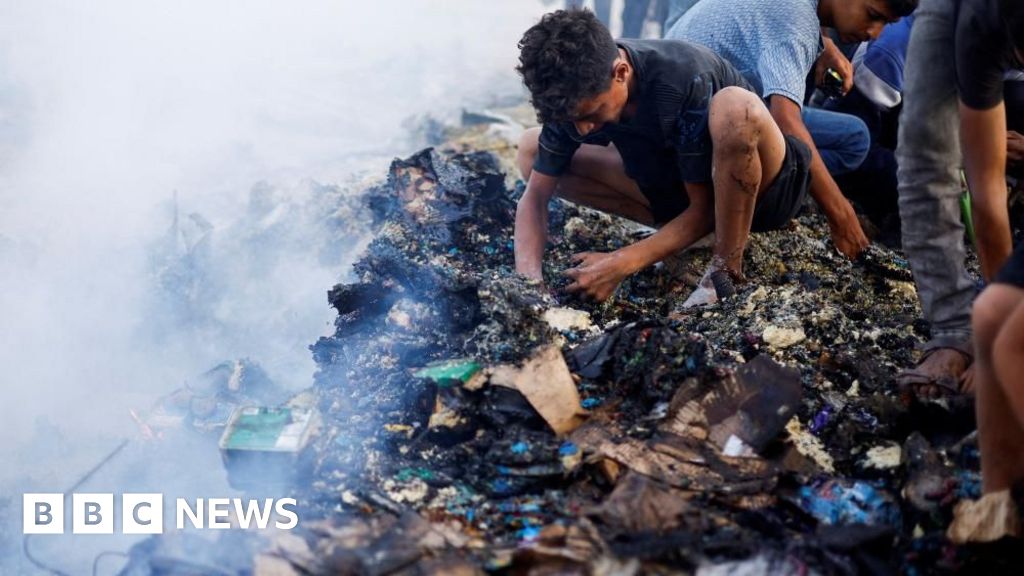
Israeli Prime Minister Benjamin Netanyahu described the attack that killed dozens of displaced Palestinians in Rafah on Sunday as a “tragic incident,” amid growing international condemnation of the explosion.
At least 45 people were killed, according to the Hamas-run Ministry of Health. Hundreds more were treated for serious burns, fractures and shrapnel wounds.
Speaking before the Israeli parliament, Netanyahu said it was necessary for Israel to take “every possible precaution” to protect civilians caught up in the fighting in Gaza.
But he insisted that the IDF had made “its utmost effort not to harm non-participants” in the conflict and pledged to continue the fight against Hamas.
- author, Matt Murphy
- Role, BBC News
- Report from London
-
“I do not intend to end the war before achieving every goal,” Netanyahu said during his speech, which was interrupted from time to time by harassment from family members of hostages taken by Hamas during the October 7 attack in southern Israel.
The Prime Minister was attacked by some family members for failing to reach an agreement for the return of their loved ones.
Netanyahu added: “In Rafah, we have already evacuated about a million non-combatants, and despite our best efforts not to harm the non-combatants, something unfortunately went tragically wrong.”
He added: “We are investigating the incident and will reach conclusions because this is our policy.”
International organizations lined up to condemn the raid, with the European Union insisting that Israel respect the ruling issued by the International Court of Justice last week to stop raids on Rafah. Josep Borrell, the European Union’s top diplomat, described Sunday’s strike as “horrific.”
Despite the ICJ ruling, Israel has vowed to continue the Rafah invasion, with officials insisting the ruling left room for attack to comply with international law.
Meanwhile, UN High Commissioner for Human Rights Volker Türk said the attack indicated “there has been no clear change in the methods and means of warfare used by Israel which have already led to the deaths of many civilians.”
Israel launched the Rafah attack on Sunday just hours after Hamas launched its first rocket attack on Tel Aviv in several months.
Israeli army officials said that the attack led to the killing of two senior Hamas leaders, and that the army was investigating the killing of civilians in the area.
But the Palestinian Red Crescent said the air strike targeted tents for displaced people near a UN facility in Tal al-Sultan, about two kilometers northwest of central Rafah.
Video clips from the scene of the accident in the Tal Al-Sultan area, on Sunday night, showed a large explosion and burning fires.
Video footage showed a number of buildings on fire next to a sign reading “Kuwait Peace Camp No. 1,” in addition to medics and passers-by carrying several bodies.
Doctors Without Borders said on Monday that one of its facilities received at least 28 dead following the raid, including women and children.
The organization said in a statement that it treated another 180 wounded Palestinians, most of whom suffered from serious injuries resulting from shrapnel, fractures, injuries and burns.
Doctors Without Borders rejected Israeli claims that the strike was accurate, saying that “the attack on a populated camp in the so-called ‘safe zone’ in Rafah shows a complete disregard for the lives of civilians in Gaza.”
In a statement issued Monday evening, the United States described the images as “heartbreaking,” but insisted that Israel has the right to defend itself.
A White House national security spokesman said: “Israel has the right to go after Hamas, and we understand that this strike killed two senior Hamas terrorists responsible for attacks against Israeli civilians.”
But they acknowledged that “Israel must take every possible precaution to protect civilians.”
Israeli officials spent much of Monday trying to figure out what went wrong in Rafah. How did a “precision strike” using specialized munitions with “low-profile warheads” lead to a firestorm that killed dozens and injured dozens more?
In the wake of last week’s ruling by the International Court of Justice that ordered Israel to halt any operations in the Rafah area that might cause further harm to the Palestinian population, Israel realizes that the eyes of the world are on it. She is under tremendous pressure to explain her actions.
It says the operation was based on intelligence, and it appears that both Hamas figures were killed.
However, the presence of large numbers of civilians, and an apparent large amount of flammable materials, raises many questions about how this incident was planned and executed.
With senior military officials, including Major General Yifat Tomer Yerushalmi, the IDF Prosecutor General, promising a comprehensive investigation, we can expect a more detailed explanation to emerge soon.
But whether this marks a turning point in the campaign is another matter.
Mr. Netanyahu remains committed to what he calls “total victory” in Rafah, so there is no indication that Sunday’s disaster will change his mind.
Despite the horrific scenes that occurred last night, it appears that Israeli ground forces are still acting somewhat cautiously as they approach the city of Rafah itself.
Their operations have not yet resulted in a bloodbath.
But that is exactly what last night’s airstrike achieved, dealing another blow to Israel’s already damaged image and undermining its justification for moving forward.

“Travel specialist. Typical social media scholar. Friend of animals everywhere. Freelance zombie ninja. Twitter buff.”





More Stories
Taiwan is preparing to face strong Typhoon Kung-ri
Israel orders residents of Baalbek, eastern Lebanon, to evacuate
Zelensky: North Korean forces are pushing the war with Russia “beyond the borders”